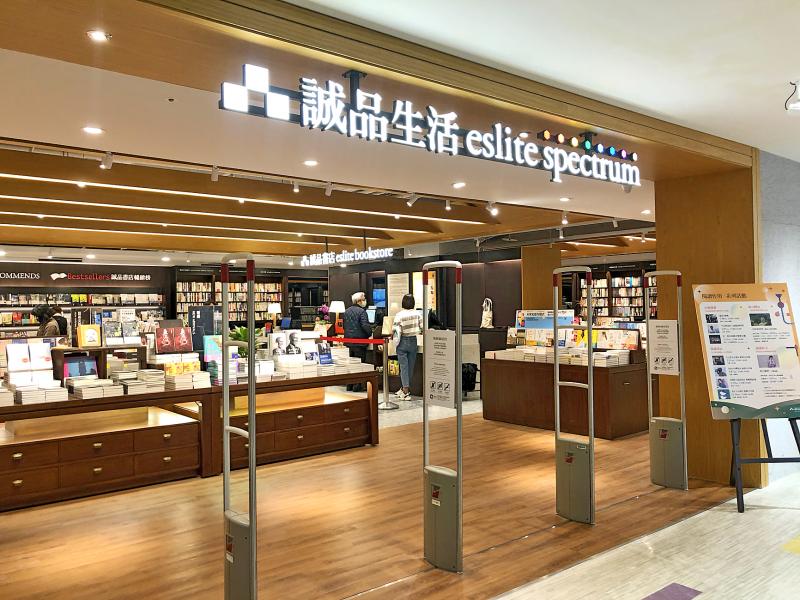Eslite Spectrum Corp (誠品生活), which runs the popular Eslite bookstore chain in Taiwan and abroad, plans to launch smaller outlets at the community level under the “eslite me-time” (誠品生活時光) brand to grow customers and sales, as the COVID-19 pandemic is reshaping consumer behavior.
The first “eslite me-time” in Taipei’s Neihu District (內湖) is smaller than 100 ping (330m2) and has a soft opening scheduled for Oct. 27 to serve an increasing number of people who prefer to shop near home to avoid COVID-19 infections, the company said.
Eslite Spectrum chairwoman Mercy Wu (吳旻潔) said that the company aims to open 300 such neighborhood bookstores within the next three years to expand its customer base, while not giving up on flagship properties.

Photo: Luo Hsin-chen, Taipei Times
The strategy would allow Eslite to extend its reach from urban central locations to communities and neighborhoods where potential customers have been underserved, Wu said, adding that the smaller-scale stores could be set up quickly in different parts of Taiwan.
The “eslite me-time” branch in Neihu would also feature a food store brand “tea room” that serves cooked meals, as well as fresh produce and fish products, the company said.
The tea room is to collaborate with a local e-commerce operators focused on farm produce to better serve customers, Eslite said.
The community bookstores seek to nurture customers’ intellectual wellbeing, while the tea room aims to take care of their physical health, the company said.
Affiliated Eslite Hotel (誠品行旅) is to take charge of cooked meals for the tea room, it said.
The company’s Web site and app will lend support to the new business, whose limited space cannot put all items available for sale on display, it said.
Eslite Spectrum has been shaking up its business model in recent years, prompted by the rise of e-commerce and the pandemic.
It has shut unprofitable properties, while planning to add new ones in more promising locations at home and in overseas markets.
Eslite is also taking a hit from social-distancing requirements and border controls as its bookstores are popular cultural attractions among foreign and domestic tourists. It operates 42 branches in Taiwan, China, Hong Kong and Japan.

On Tuesday, US President Donald Trump weighed in on a pressing national issue: The rebranding of a restaurant chain. Last week, Cracker Barrel, a Tennessee company whose nationwide locations lean heavily on a cozy, old-timey aesthetic — “rocking chairs on the porch, a warm fire in the hearth, peg games on the table” — announced it was updating its logo. Uncle Herschel, the man who once appeared next to the letters with a barrel, was gone. It sparked ire on the right, with Donald Trump Jr leading a charge against the rebranding: “WTF is wrong with Cracker Barrel?!” Later, Trump Sr weighed

Taiwan Semiconductor Manufacturing Co (TSMC, 台積電) secured a record 70.2 percent share of the global foundry business in the second quarter, up from 67.6 percent the previous quarter, and continued widening its lead over second-placed Samsung Electronics Co, TrendForce Corp (集邦科技) said on Monday. TSMC posted US$30.24 billion in sales in the April-to-June period, up 18.5 percent from the previous quarter, driven by major smartphone customers entering their ramp-up cycle and robust demand for artificial intelligence chips, laptops and PCs, which boosted wafer shipments and average selling prices, TrendForce said in a report. Samsung’s sales also grew in the second quarter, up

HEADWINDS: Upfront investment is unavoidable in the merger, but cost savings would materialize over time, TS Financial Holding Co president Welch Lin said TS Financial Holding Co (台新新光金控) said it would take about two years before the benefits of its merger with Shin Kong Financial Holding Co (新光金控) become evident, as the group prioritizes the consolidation of its major subsidiaries. “The group’s priority is to complete the consolidation of different subsidiaries,” Welch Lin (林維俊), president of the nation’s fourth-largest financial conglomerate by assets, told reporters during its first earnings briefing since the merger took effect on July 24. The asset management units are scheduled to merge in November, followed by life insurance in January next year and securities operations in April, Lin said. Banking integration,

LOOPHOLES: The move is to end a break that was aiding foreign producers without any similar benefit for US manufacturers, the US Department of Commerce said US President Donald Trump’s administration would make it harder for Samsung Electronics Co and SK Hynix Inc to ship critical equipment to their chipmaking operations in China, dealing a potential blow to the companies’ production in the world’s largest semiconductor market. The US Department of Commerce in a notice published on Friday said that it was revoking waivers for Samsung and SK Hynix to use US technologies in their Chinese operations. The companies had been operating in China under regulations that allow them to import chipmaking equipment without applying for a new license each time. The move would revise what is known